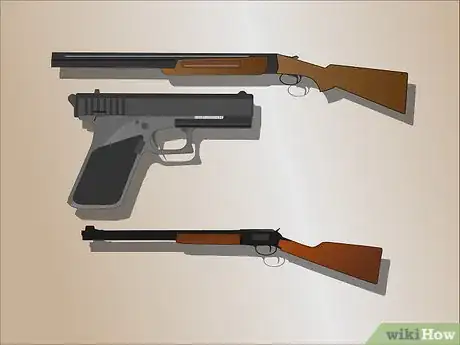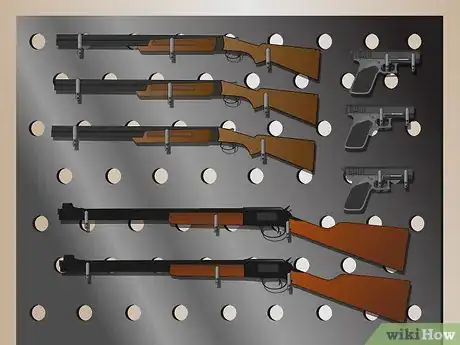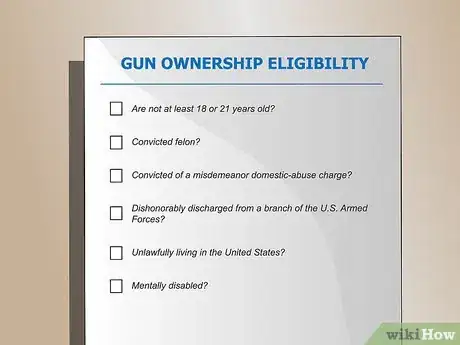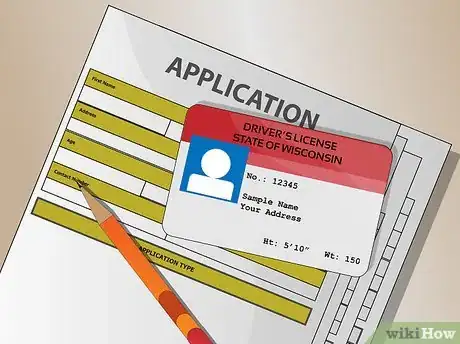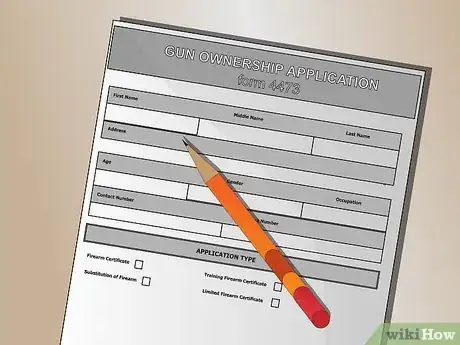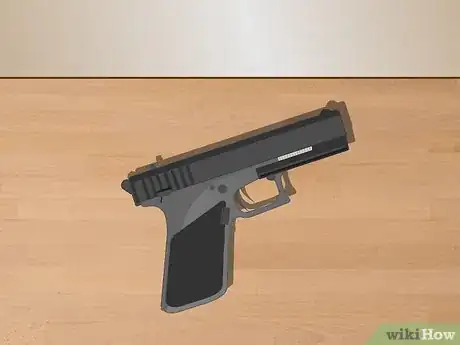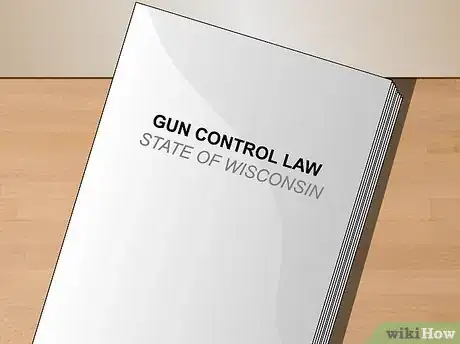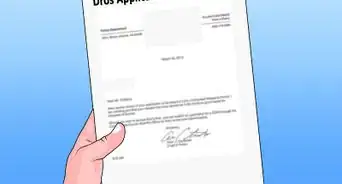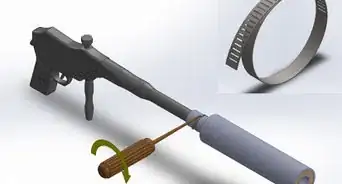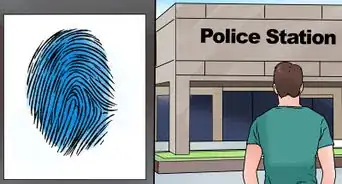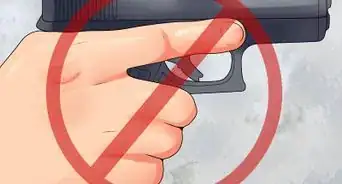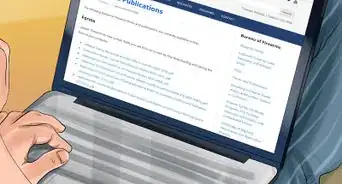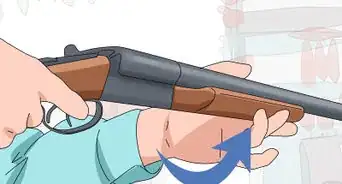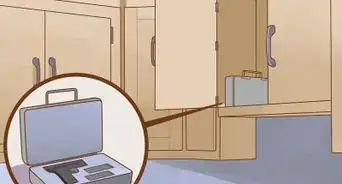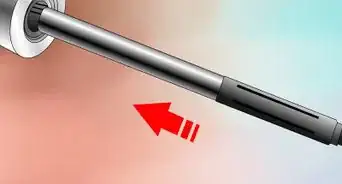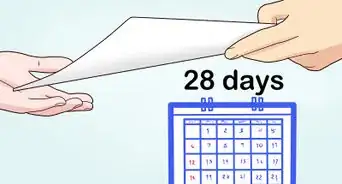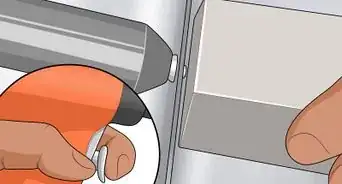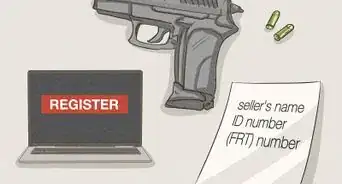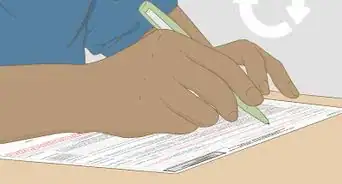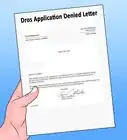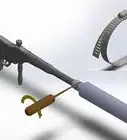wikiHow is a “wiki,” similar to Wikipedia, which means that many of our articles are co-written by multiple authors. To create this article, 9 people, some anonymous, worked to edit and improve it over time.
wikiHow marks an article as reader-approved once it receives enough positive feedback. In this case, 92% of readers who voted found the article helpful, earning it our reader-approved status.
This article has been viewed 172,660 times.
Learn more...
The Wisconsin Legislature changed the makeup of gun ownership in the state when it passed a law on concealed-weapons permits in early 2011. The law allows residents who meet strict guidelines to carry a handgun on their person. While Wisconsin gun laws differ from other states, residents must comply with federal regulations by meeting certain basic requirements. Follow these steps if you want to learn how to buy a firearm in Wisconsin.
Steps
-
1Decide what kind of firearm best suits your needs. Handguns are ideal for self- or home defense. They can be brought to bear quickly on intruders. If you want a weapon that can fill multiple roles, a shotgun probably is right for you. Rifles are best for hunters.
- Revolvers: Revolvers use a cylinder that rotates each time the weapon is fired, putting a fresh round in the chamber. They are simple to operate and seldom jam, but can be difficult to reload.
- Pistols: Semi-automatic handguns generally hold more bullets than revolvers. They rest in a magazine, or clip, that the user slides into the weapon. A spring mechanism ejects each spent cartridge and loads the next round into the chamber.
- Shotguns: Shotguns often are used in hunting and sport shooting, but also are effective weapons for home defense. They fire shells that can either disperse pellets or individual lead slugs. They can be single-action, pump- or bolt-action, or semi-automatic. Single-action shotguns must be reloaded after each use. Pump- and bolt-action shotguns hold multiple shells that must be ejected from the chamber manually. Semi-automatic shotguns work much like pistols. In general, shotguns are more powerful than handguns. They're also easier to use and have a wider range of uses.
- Rifles: Rifles fire high-velocity rounds at distances of several hundred yards. They are best for long-range shooting, and therefore aren't practical for most people.
-
2Try different weapons. Most gun stores will let you fire several guns before you make your purchase. Ask the dealer to help you find one that meets your needs. Make sure you can lift the weapon easily and withstand its recoil when you fire it.
-
3Determine whether you're eligible to own a gun. Federal law prohibits certain individuals from possessing firearms. You cannot own a gun if you meet any of the following conditions:[1]
- Are not at least 18 years old to purchase a long gun; 21 to buy a handgun.
- Are a convicted felon.
- Were convicted of a misdemeanor of domestic-violence.
- Are subject of a restraining order.
- Were dishonorably discharged from a branch of the U.S. Armed Forces.
- Are living in the United States unlawfully.
- Are mentally disabled.
-
4Bring the necessary paperwork when you're ready to make your purchase. In Wisconsin, a buyer must show a valid Wisconsin driver's license or state-issued ID card with a current, valid address to the gun dealer.[2]
-
5Complete the gun-ownership application process. After the dealer accepts your information, you will be required to carry out the following:
- Complete Form 4473, the questions on this form will show the dealer you are buying from that you can lawfully and legally possess the firearm you are intending to purchase. If you are purchasing a handgun you will also need to fill out the state background check form in addition to the Federal Form 4473.[3]
- Dealer will submit your information to the National Instant Criminal Background Check System for a long gun purchase. If purchasing a handgun they will use the state background check form and submit it to WI DOJ (Wisconsin Dept Of Justice.) via their website or phone.
- There is no waiting period for long guns or handguns in the State of Wisconsin. To qualify for a concealed-weapons permit in Wisconsin, prospective gun owners must meet all the conditions set forth by state and federal laws and must complete a 1-day gun-safety training course.[4]
-
6Pick up your gun. After the dealer gets the background check approval, you may take possession of your firearms.
-
7Acquaint yourself with Wisconsin gun laws. Wisconsin's gun-control laws are different from other states. Wisconsin residents can carry concealed weapons beginning Nov. 1, 2011. Wisconsin prohibits having a weapon in or near any of the following:[5]
- Secure area of an airport.
- A courthouse or any other area that posts the prohibition of firearms at the site.
- School zones.
- Anywhere while you're under the influence of drugs or alcohol.
Community Q&A
-
QuestionAm I able still able to purchase a handgun if I am a permanent resident and meet all of the other requirements?
 Community AnswerAs long as your visa is in order (assuming you are from another country originally), you should still be able to. The law only prevents unlawful residents from obtaining handguns, such as those who did not enter through the proper channels.
Community AnswerAs long as your visa is in order (assuming you are from another country originally), you should still be able to. The law only prevents unlawful residents from obtaining handguns, such as those who did not enter through the proper channels. -
QuestionHow old do I have to be to get a firearm permit?
 Community AnswerWisconsin doesn't have a permit system in place. At 18 you can purchase a long gun, and at 21 you can purchase a handgun and/or get a concealed carry license. * Note that these are purchase age not possession age.
Community AnswerWisconsin doesn't have a permit system in place. At 18 you can purchase a long gun, and at 21 you can purchase a handgun and/or get a concealed carry license. * Note that these are purchase age not possession age. -
QuestionDo I need to have a hand gun to take the gun safety course?
 Community AnswerThat depends, some classes require it but most provide their own firearms or dummy-guns to practice with.
Community AnswerThat depends, some classes require it but most provide their own firearms or dummy-guns to practice with.
Warnings
- Keep your finger off the trigger until you are ready to fire.⧼thumbs_response⧽
- Treat every firearm as if it were loaded at all times.⧼thumbs_response⧽
- Never point a firearm at something you aren't comfortable destroying.⧼thumbs_response⧽
- When shooting, be certain of what you're aiming at, what's in front of it, behind it, and around it.⧼thumbs_response⧽
- Guns are not toys. If you don't take basic precautions you could kill or seriously injure yourself or somebody else.⧼thumbs_response⧽
References
- ↑ https://www.nraila.org/articles/20040324/citizen-s-guide-to-federal-firearms-law
- ↑ https://www.nraila.org/gun-laws/state-gun-laws/wisconsin/
- ↑ https://www.wisconsinwatch.org/2016/08/background-checks-dealer-licensing-requirements-in-wisconsin-explained/
- ↑ https://docs.legis.wisconsin.gov/statutes/statutes/175/60
- ↑ https://www.wisbar.org/newspublications/wisconsinlawyer/pages/article.aspx?Volume=85&Issue=7&ArticleID=8710
- http://www.newser.com/story/121622/wisconsin-passes-concealed-carry-law.html
